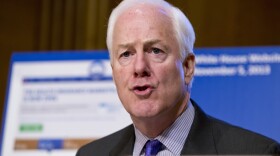U.S. Rep. Steve Stockman, a Friendswood Republican with a history of flouting campaign finance laws, entered a new legal gray area this week when he announced his campaign can now accept donations in Bitcoin, a private virtual currency.
Stockman, who is challenging U.S. Sen. John Cornyn of Texas in this year’s Republican primary, was attending an event promoting the NYC Bitcoin Center in New York's financial district earlier this week when he told a reporter with Business Insider that his campaign could now accept Bitcoin donations. Stockman appeared to confirm the report by posting it on Facebook and Twitter.
Stockman isn’t the first politician to embrace Bitcoin, though he may be the first elected official to do so. Among the legal concerns about Bitcoin campaign donations is that the virtual currency makes it easier to make donations anonymously; federal campaign finance laws require candidates to reveal the names of their contributions. Few businesses currently accept Bitcoin though acceptance has been growing over the last year.
A spokesman with the Federal Elections Commission could not say whether Bitcoin donations are legal. In November, the FEC considered whether to explicitly allow federal candidates and political action committees to accept Bitcoin donations as in-kind donations. The committee deadlocked, 3-3. The commission has not taken up the issue since the November vote, a spokesman said.
Whether Stockman has actually received any Bitcoin donations is unclear. As of Friday morning, his campaign website’s donation page made no mention of Bitcoin. However, in a photo that has circulated online since Tuesday, Stockman is seen at the NYC Bitcoin Center event holding a poster with a scannable QR code on it. The code is a link to a Bitcoin account, but it is not clear if the account is Stockman’s campaign fund. Since Tuesday, the account has received Bitcoin payments worth more than $200.
When asked about the QR code in the photo in an email, NYC Bitcoin Center spokesman Hamdan Azhar wrote back, “Congressman Stockman's office would probably be best suited to address your question.” A Stockman spokesman has not responded to inquiries about the QR code or whether the campaign has received any Bitcoin donations.
Along with announcing plans to accept Bitcoin donations, Stockman also plans to file a bill that would keep federal or state regulators from interfering with “Bitcoin and the Bitcoin economy,” according to an article on a Bitcoin news site that Stockman tweeted Thursday.
“I really think digital currency is all about freedom,” Stockman said in a video shot in Manhattan and posted on YouTube this week. “Bitcoin is going to be an alternative for citizens who are free to determine their own future and be able to keep their own wallet.”
The coordinated effort could help Stockman appeal to Libertarian-leaning members of the Tea Party in Texas who are critical of U.S. monetray policy and are often associated with former Texas Congressman Ron Paul.
“One day, you’re printing so much the currency will become worthless and that’s why it’s important to have gold and other things that are static that no one can fluctuate at a rapid rate,” Stockman said in the video. “And that’s why it’s so good to have Bitcoin. It’s a fixed amount of currency at a fixed rate. So it’s very good for the market.”
Cornyn campaign spokesman Drew Brandewie mocked Stockman’s Bitcoin announcement Thursday, tweeting, “Apparently not having luck with real $, Stockman taking Bitcoin donations to campaign.”
Stockman, who served in the House for one term starting in 1995 and then won election again in 2012, has a history of running afoul of campaign finance laws. Last year, he terminated two staffers for making improper donations to his campaign fund. Last month, the FEC sent Stockman’s campaign a letter questioning some possible “excessive contributions” from supporters of Indian gaming. As of Sept. 30, Stockman’s campaign account was $163,000 in debt, according to the FEC.



